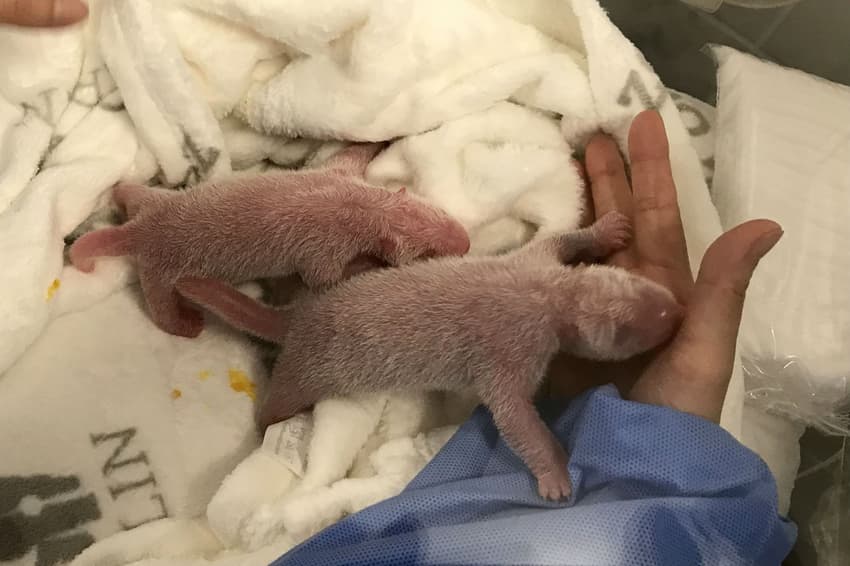Berlin panda Meng Meng gives birth to twins

Panda Meng Meng gave has given birth to bright-eyed twins, the Berlin Zoo announced Monday.
"Meng Meng and her two offspring coped well with the birth and are in good health,” said Zoo director Andreas Knieriem in a press release on Monday.
The first boy was born shortly before 7pm on Saturday. Almost an hour later the second followed. Together they weigh only a little more than 300 grams, are pink and hardly resemble their mother.
But Meng Meng didn’t seem to mind that, and quickly grew into her new role.
"She immediately laid the young animal gently on her stomach and began to warm him lovingly with her big paws, her warm breath and the soft fur of her cheeks," the zoo says.
Meng Meng became a mom – twice! We are so happy, we are speechless! ❤️???❤️
#babypandasberlin #pandasberlin #ZooBerlin pic.twitter.com/SKQvxMxO4z
— Zoo Tierpark Berlin (@zooberlin) September 2, 2019
After earlier unsuccessful attempts, Saturday's twin birth is the first panda birth in Berlin. It comes less than a week after the zoo confirmed that that Meng Meng (6) was pregnant.
The new panda mother and the offspring’s father Jiao Qing (9) have been living in Berlin Zoo since summer 2017. They are both on loan from a reserve in Chengdu, China.
"What great news! All of Berlin is happy about these two new arrivals and I congratulate Andreas Knieriem and his zoo team", governing Mayor Michael Müller (SPD) was quoted as saying.
Chinese experts and the team of the Berlin Zoo had eagerly anticipated the birth. Animal keepers, veterinarians, biologists and rearing experts observed the panda mum around the clock.
For the time being, the panda mother and her babies cannot be seen by zoo visitors.
According to the zoo, the offspring will probably spend up to four years in Berlin, after which they will leave their mother "and leave Berlin for China".

Meng Meng at the Berlin Zoo. Photo: DPA
Famed for its "panda diplomacy", China has dispatched its national treasure to only about a dozen countries as a symbol of close relations.
The zoo pays $15 million (€13.4 million) for a 15-year contract to host them, with most of the money going towards a conservation and breeding research programme in China.
While the cubs are born in Berlin, they remain Chinese and must be returned to China within four years after they have been weaned.
China has previously given three pandas to Germany but the last one, 34-year-old Bao Bao, died in Berlin in 2012, having become the oldest male panda in the world.
About 1,864 pandas remain in the wild in China, up from around 1,000 in the late 1970s, according to the environmental group WWF.
Just over 400 pandas live in zoos around the world, in conservation projects set up with Beijing.
Comments
See Also
"Meng Meng and her two offspring coped well with the birth and are in good health,” said Zoo director Andreas Knieriem in a press release on Monday.
The first boy was born shortly before 7pm on Saturday. Almost an hour later the second followed. Together they weigh only a little more than 300 grams, are pink and hardly resemble their mother.
But Meng Meng didn’t seem to mind that, and quickly grew into her new role.
"She immediately laid the young animal gently on her stomach and began to warm him lovingly with her big paws, her warm breath and the soft fur of her cheeks," the zoo says.
Meng Meng became a mom – twice! We are so happy, we are speechless! ❤️???❤️
— Zoo Tierpark Berlin (@zooberlin) September 2, 2019
#babypandasberlin #pandasberlin #ZooBerlin pic.twitter.com/SKQvxMxO4z
After earlier unsuccessful attempts, Saturday's twin birth is the first panda birth in Berlin. It comes less than a week after the zoo confirmed that that Meng Meng (6) was pregnant.
The new panda mother and the offspring’s father Jiao Qing (9) have been living in Berlin Zoo since summer 2017. They are both on loan from a reserve in Chengdu, China.
"What great news! All of Berlin is happy about these two new arrivals and I congratulate Andreas Knieriem and his zoo team", governing Mayor Michael Müller (SPD) was quoted as saying.
Chinese experts and the team of the Berlin Zoo had eagerly anticipated the birth. Animal keepers, veterinarians, biologists and rearing experts observed the panda mum around the clock.
For the time being, the panda mother and her babies cannot be seen by zoo visitors.
According to the zoo, the offspring will probably spend up to four years in Berlin, after which they will leave their mother "and leave Berlin for China".

Meng Meng at the Berlin Zoo. Photo: DPA
Famed for its "panda diplomacy", China has dispatched its national treasure to only about a dozen countries as a symbol of close relations.
The zoo pays $15 million (€13.4 million) for a 15-year contract to host them, with most of the money going towards a conservation and breeding research programme in China.
While the cubs are born in Berlin, they remain Chinese and must be returned to China within four years after they have been weaned.
China has previously given three pandas to Germany but the last one, 34-year-old Bao Bao, died in Berlin in 2012, having become the oldest male panda in the world.
About 1,864 pandas remain in the wild in China, up from around 1,000 in the late 1970s, according to the environmental group WWF.
Just over 400 pandas live in zoos around the world, in conservation projects set up with Beijing.
Join the conversation in our comments section below. Share your own views and experience and if you have a question or suggestion for our journalists then email us at [email protected].
Please keep comments civil, constructive and on topic – and make sure to read our terms of use before getting involved.
Please log in here to leave a comment.